
*
Does Jonathan Groff ever repeat himself when he chooses projects? Sure, his turn as Claude in a Shakespeare in the Park concert of Hair echoed the youthful rebellion that he exhibited in Broadway's Spring Awakening, which might have rubbed off on him to play Woodstock concert organizer Michael Lang in the feature "Taking Woodstock," but you can't really pin down what exactly Groff is. Not yet 30, he is somewhere between what used to be called "the juvenile lead" and a leading man, and he has skillfully moved between diverse projects: An alt-rock musical based on a modern expressionist classic (Spring Awakening); a multi-generational family drama spanning decades and continents (Craig Lucas' The Singing Forest); a twisty murder mystery (Ira Levin's Deathtrap in London, with Simon Russell Beale); a family drama with characters in the shadow of the Iraq War (Lucas' Prayer for My Enemy); a dark showbiz comedy of ideas (Jeff Talbott's The Submission); a whimsical musical TV show (playing the recurring bad-boy singer Jesse St. James, tormenter of his Spring Awakening co-star Lea Michele, on "Glee"); a two-actor character study about art and artists, fathers and sons, mentors and students (currently playing Ken, the artist's assistant opposite Alfred Molina's Mark Rothko in John Logan's Tony Award-winning play Red at Mark Taper Forum); and a ripe, profane political TV soap opera (playing a talented young political advisor to Kelsey Grammer's Chicago mayor on the second season of "Boss," which premiered Aug. 17 on cable's STARZ).
We caught up with Groff by telephone from Los Angeles the day after his Aug. 12 opening night of Red, directed by Michael Grandage. (Performances continue to Sept. 9.)
Red is one of my favorite plays ever.
Jonathan Groff: It's so good. When I saw it two years ago, when it was in New York, I was completely blown away by it. Blown away by the play and blown away by the lighting and the set and, obviously, the performances in it. I just loved it. I saw it right after it opened [in spring 2010]. In January or February of this year, I heard that they were doing it at the Taper, and I called my agent about it and said, "I heard that Eddie Redmayne was not able to do it for whatever reason," and I said I really wanted to get involved. He said, "Well, you've got to fly yourself to New York and meet Michael Grandage," because he was rehearsing for Evita. And so I flew myself and met him on a lunch break and did a couple of monologues, and that's sort of how it began.
| |
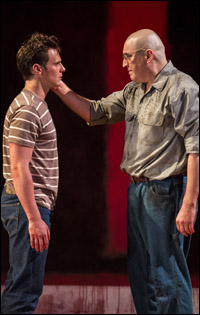 |
|
| Groff and Alfred Molina in Red at Mark Taper Forum in Los Angeles. | ||
| photo by Craig Schwartz |
JG: One of the things that attracted me to it the most is that I knew it was going to be a recreation of that original production, and I knew it was going to be Michael Grandage directing it, and I knew it was going to be Alfred Molina. Even beyond the excitement of being able to do that play and that role, getting to do it with the people that originally created it was also a huge, exciting draw. [Read Playbill.com's 2010 Brief Encounter interview with director Michael Grandage, on the subject of Red.]
Fred Molina has the advantage of his part being based on a real-life character. There is biographical background available to help inform his creation of the character. Do you find the Ken role to be kind of freeing or did you wish you were anchored to a real character?
JG: That's a good question. I mean, he's sort of loosely based on the assistant that Rothko had during the time of the Seagram murals, which they gave me an in-depth interview about. But certainly all of the stuff about Ken's parents' deaths and everything else is completely made up for the play. I feel like those characters are so well-drawn, and the journey and the arc of each character is so specific in the play — it's so right-there-on-the-page — Ken feels just as real and authentic as Rothko does. So I don't feel any sort of wish that it was based on a real character.
I was talking about this the other day with Fred when we were having dinner between shows: There's almost no acting required in that way. The journey is so clearly mapped out for you in the words of the play, that you sort of have to go out and do it. There's no "I've got to make this work or see how this goes" or "How are we going to sell this moment?" or whatever. It's so specifically out there for you.
| |
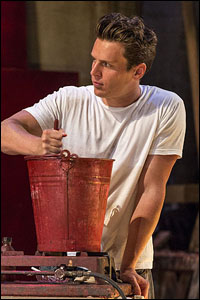 |
|
| Groff as artist's assistant "Ken" in Red. | ||
| Photo by Craig Schwartz |
JG: [Laughs.] Yeah, we did read about that…! When we were at Baruch College doing the workshop [for Spring Awakening], [director] Michael Mayer gave us homework assignments about Germany in the 1890s and all of that.
And did you read about the 1950s and '60s art scene for Red?
JG: I got a bunch of books on Rothko, and then I got to see [the art of the period]. I was in Chicago right before rehearsals for Red, shooting "Boss," and they just happened to be doing a Roy Lichtenstein retrospective at the Art Institute of Chicago, so I got to check that out. I was so pumped and inspired by the art, I wanted to see as much art as I could. It's one thing to talk about art and see it in books, but then seeing it in person is a totally different thing. We took a little field trip to MOCA [Museum of Contemporary Art, in Los Angeles]. We actually had our opening night party last night at MOCA. People got to walk through and look at the Rothkos. They have a huge, pretty significant collection of Rothko paintings there.
In July, when we were rehearsing, I flew to Houston on our day off. This was our third week of rehearsal. I flew to Houston to go see the Rothko Chapel, which was really interesting because it's the last series [of paintings] that he did before he committed suicide. All the paintings are really close to black and dark purple. And, it's set up as a meditation room with little cushions, and people sit and sit there for hours. I spent three hours in there just looking at the paintings and watching them move. It was really kind of depressing, actually. That room made me feel kind of sad. But, yeah, I love [research]. Even throughout the run of the play — a couple of days ago, I was at MOCA again. I go back between shows and before, sometimes, just to sort of get inspired. I bought a book about pop art that I'm reading. Love that. Sometimes it doesn't inform what you're doing at all — but sometimes it does. You never know what's going to stick.
Some of that must simply seep into you on a cellular level.
JG: Exactly. Knowing what it feels like to look at something — a piece of art — for a long time. We talk a lot about Jackson Pollock in the play, and I started reading about Jackson Pollock a little bit, and suddenly the ideas made more sense and deepened a little bit. My sort of general theory on research is that you just do it because, "Why not?" You do it as much as you can. If it helps the play, great. If not, then… I just enjoy doing it to begin with, so I don't mind doing it.
| |
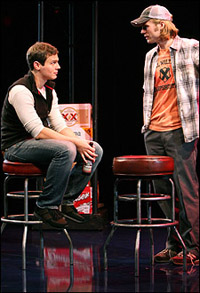 |
|
| Jonathan Groff and Zachary Booth in Prayer for My Enemy. | ||
| Photo by Joan Marcus |
JG: Yeah… Although, for Prayer for My Enemy I learned a lot about the war in Iraq, which was really upsetting. [Laughs.] There was a DVD — I can't remember what the DVD was that Craig Lucas gave me — it's based on a book. It was devastating. Yeah, The Submission was close to my life, so I did a little research about the Humana Festival [a setting in the play] and stuff, but other than that, that was pretty much very close to the world that I live in.
Did Red director Michael Grandage and his collaborators introduce you to paints and the physical world of an artist, in terms of you just grabbing onto canvases and paints and brushes?
JG: Yeah. That was sort of trial-by-fire. Grandage doesn't do table work. You just jump right into it. We both came into the rehearsals off-book. That was part of the requirement for this production because we had a short amount of time, and they'd all done it before, so they asked me to come in off-book. The play is, like you said, so physical with the painting and the moving and the putting-up-and-down canvases. When I walked in on the first day of rehearsal, the rehearsal room was the studio. The entire set was set up in the rehearsal room, and I was like, "Oh my God." I got this huge pit in my stomach. "Oh, wow. We're really doing this on day one, here we go!" [Laughs.] Jumping right in. Usually, it's a bare rehearsal room, and slowly costume pieces get involved — you figure out as you go. It was sort of intense. The only painting technique that I learned was how to [prime] that canvas — getting the right amount of paint on your paintbrush and making sure you don't leave streaks and keeping things even and making sure you're in sync with each other. It's like a dance, it's like a choreographed dance. And then building, stapling and hammering of the canvas — putting that together. It's very physical. It's really satisfying in that way — hammering and painting and getting to do all of that. It's really fun.
You're literally using muscles you haven't used before.
JG: Exactly. My wrist is really sore from painting! [Laughs.] I never used it that way before.
There's a kind of unnatural amount of bending and reaching. I assume that you were sore for the first couple of weeks.
JG: Yeah, it's true. Fred started working out with a trainer a couple of weeks ago just to get back into it, and he told his trainer what he does in the play, so they worked out his leg muscles and his reaching… Yeah, it's very physical. I feel physically exhausted after the play is over because it's a lot of movement, and you're on stage non-stop. It's just the two of you. It's so fun, though.
| |
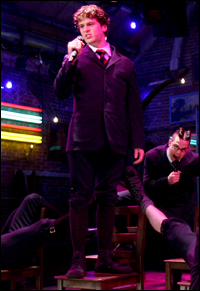 |
|
| Groff in Spring Awakening. | ||
| Photo by Joan Marcus |
JG: Yes! Yes!
Are you bike-riding in L.A.?
JG: Well, it's funny you say that. I have my bike here, and I'm nervous to do it. I ride my bike everywhere in New York — I love it — it's my favorite way to get around. I had started riding in L.A. in the late winter before I went for Chicago [to shoot "Boss"]. I bought a bike here, and I started riding around here, and the cars are not quite aware. I think there's a lot more texting, and there's a lot more swerving and sort of unfocused driving. The driving in New York is very aggressive and very intense, but very aware of what's around. The cab drivers and everyone are very aware of what's going on because everyone's going fast and stopping for red lights or whatever, so when you're on your bike, you feel like everyone knows you're there. But in L.A. — I'm on a tirade now, I'm sorry: In L.A., there's less of a respect for bike riders on the roads here, I found. People will beep at you and try and sort of cut you off, and it's slightly more dangerous. So I haven't [been biking], although just a couple of nights ago I was thinking, "God, I would really love to be riding my bike home from this play right now instead of getting into my car." So I think it's going to happen now that we're out of rehearsal — we just opened last night — so I have a feeling that I'm going to end up riding a little bit to and from the theatre, but probably not as much as I did in New York. It would be a 45-minute bike ride.
Isn't the Taper downtown?
JG: Yeah, the Taper is downtown.
Are there dedicated bike lanes?
JG: There are some, yeah, but not as much as in New York. And, the great thing about riding to the Lortel was the West Side Highway bike path, which is what I took the whole way down, which is just like heaven. I would take videos with my iPhone while I was riding my bike because I couldn't believe how beautiful and peaceful it was to be riding.
This is just what your parents and your agents don't want to hear.
JG: [Laughs.] Exactly! But it's on a bike path, and I wasn't going fast. I would never do that on the road. I also never listen to music while I'm on my bike. That's a little personal promise I made to myself. And, I always wear a helmet. A couple months ago, I interviewed Sutton Foster when she was shooting "Bunheads" out in L.A. You know "Bunheads"?
JG: Yup. Hello?! Of course I know it! I thought she was awesome.
I asked her if she's into the California thing. I asked, "Are you hiking? Are you eating Mexican food? Are you going to the beach?" Because she's in a series, she didn't have any time to do any of that. Are you able the soak up California? Beach? Hiking?
JG: Yes! I've had probably a lot more downtime here that she had, where I haven't been working — I've just been auditioning. It's so different from New York. For me, New York is the number one place. It's my favorite city in the world, and it's my favorite place to live as well. But, that being said, I really have found things out here that I enjoy. There's this amazing pool — 15-meter outdoor pool at UCLA — where I learned to swim two years ago that I go to all the time that I love. And, the hiking here is so great. I love working out. I love all of that: the running outside here, outside the reservoir area and the canyons and whatnot, is really great. Really great.
Ideal scenario — you living in New York six months out of the year and in L.A. for six months?
JG: Yeah. I mean, I do love having both. I have a little studio apartment in New York, and I have a little studio apartment here. Yes, I think, yeah. Maybe more than six months in New York, but it's certainly nice to be living in both places because there's something, too, about L.A. that's sort of like you're on a vacation. It can be really lonely here because everyone has to get in their cars to meet and go places. And, in New York, you kind of spill out on the street and find yourself doing things and meeting people without having to plan it. A little back and forth would be great.
| |
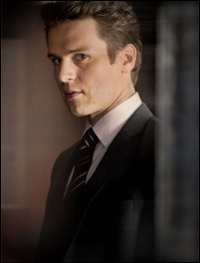 |
|
| Groff on "Boss." | ||
| STARZ |
JG: Yeah. We shot in Chicago from March until July.
Chicago is a totally different vibe.
JG: A totally different vibe, but I loved Chicago a lot. I really, really liked it. I lived in downtown. I lived in the River North section on Dearborn Street. The people from Chicago said Chicago is the worst city to live in in the winter and the greatest city to live in in the summer. And, we were there from March to July. It was a very mild winter, so we really got to hit the nice part of Chicago. I mean, there's live music outdoors all the time there. And, that lake — Lake Michigan — it's heaven. It's so nice. I did a lot of bike riding there, for sure.
You were new to Chicago?
JG: Well, I'd been for a couple of days in high school, but I've never spent any serious time there. That was really fun to get to learn that city. When I was in London doing Deathtrap, Estelle Parsons was so adventurous and saw so many more things than I did, and when that experience was over, I made a promise to myself where I said, "If ever I get the chance to live in a new city again for a job, I'm going to sort of attack it like Estelle Parsons did and make sure I see something different every day." Even if it's just walking down a different street or taking a different route or something, I'll really get to know the city. And so I did that with Chicago. It was really great. I saw a bunch of theatre there that I really liked and did all the art museums, did the architectural boat tour. It was really fun.
Did you see Seurat's "Sunday on La Grande Jatte" at the Art Institute?
JG: Yes, I did! Of course! Hello!
I've never seen it in person.
JG: Oh, it was amazing! That museum is incredible. I went a couple of times to that museum. That's where the Lichtenstein retrospective was. Amazing. It's so big, and they have so much stuff there. It's funny that you mention that, too, because my agent's boyfriend who came to see the show last night said to me at the after-party, "I feel like you're having your Sunday in the Park moment in Red. The end is like 'Move On.'" I said, "Oh my God. I love that." I'm in the middle of Netflixing the first season of "Boss" to prepare for your entrance in season two. Kelsey Grammer is the corrupt longtime mayor of Chicago. I really don't have a sense of your character, Ian Todd. Can you tell me in a nutshell?
JG: Yeah. He's basically Kelsey's new political advisor. He's this young, super-ambitious upstart, and he holds a very intense secret that gets revealed a couple of episodes into the season. It's all sort of crazy and dark from there. It's really an epic show. It's a very dramatic, a very intense ride. Kelsey's giving an epic performance. And, it's very Shakespearean. You'll see when you watch it. I watched the first season because I got the audition for the show. I was like, "Okay, I'll watch it." And, I was so blown away by it. The writing is so good, and the way that it's shot is really unique — and sort of unlike anything I've seen on TV before. Gus Van Sant shot the pilot, and so it's all hand-helds and all-natural light. It's very sort of shaky and weird close-ups of people's eyeballs — really sort of cool artistic shots. I was like, "Oh, cool. I would love to get into that." The audition scene that they gave me — again, like Red, it was: "Oh, no work required. I just have to play this scene. It's so beautifully written." I didn't know the secret that my character holds until we started shooting. My whole storyline….they kept it a secret for me. That, obviously, would have really attracted me to the role had I known beforehand. But what I was most excited about was knowing that I was going to play Kelsey's assistant and knowing I was going to spend a lot of time sort of watching him work. I really wanted to do that. I knew that the writing was so good. That's why I wanted to jump in.
| |
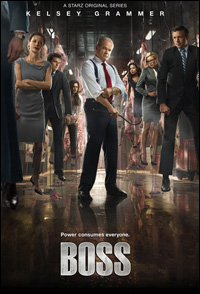 |
|
| A season-two ad for TV's "Boss" |
JG: [Laughs.] Yes! We're hanging on meat hooks!
I said, "Is that Jonathan Groff hanging from a meat hook?"
JG: [Laughs.] "Just where he belongs!" We were actually hanging for that photo shoot. They strung us up. Like Mary Martin in Peter Pan, we were in harnesses, and they hung us up and took our picture, and then somehow cut it and moved it around and made us look like we were hanging from meat hooks.
I just assumed it was all illustrated and not a shoot.
JG: Yeah, no. It was totally a photo shoot! [Laughs.] The background — the meat — was not there, and we all hung separately, and they edited us together, but we were, like, hanging. We were actually hanging!
And, you were in a suit?
JG: Yes! [Laughs.] I was in a suit that they had to bust the back out of so they could fit the harness through. I mean, it was very intense.
And, it's supposed to represent Chicago's stockyards — the slaughterhouses that made it "Hog Butcher for the World."
JG: Exactly, yeah. Yes. You know what time it is!
I think there's a big pile of entrails under one of you — the insides of a cow plopped on the floor.
JG: [Laughs.] Oh my God. I've got to look closer! Oh my God.
| |
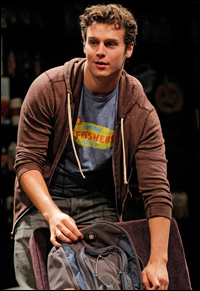 |
|
| Groff in The Submission. | ||
| photo by Joan Marcus |
I'm curious to know if you learn things from every project that you do? Are you conscious of specific lessons?
JG: Yes. I absolutely do. This sounds a little heady and hippie, but I definitely believe that every project that you end up working on is there for a very specific reason and for a very specific lesson — whether it's something that you realize in the moment or something that you realize five years later. Last night, I had a moment with [playwright] John Logan before Red. I was talking about how this play is ever-so-slightly shifting [the way I see the world]. Whenever I go to the museum, I hear Alfred's voice in my head when [his Rothko] says, "Look forward. Lean into it. Engage with it," when he talks about "a generation that doesn't aspire to seriousness isn't worthy to stand," and the people who came before them. I feel myself engaging even more, even more, even more with the people in my life, with the things in my life. If I go to see a movie, if I go to see a play, if I have dinner with a friend, I just feel myself leaning — figuratively, I guess — leaning forward as Rothko is commanding me to do in the play every night.
I think it's also the repetition. Which is to say, when you're talking about something over and over and over again eight times a week, it starts to really seep into your mind and seep into your heart and your soul. Even in The Submission last year. All of the issues and things we were talking about. This happened to me a month ago, where somebody was making an off-color joke, and I was like, "Ewww…!" The hair on my neck stood up a little bit in a way that it never would have if I hadn't done Submission last year for the month and a half that we did it, just because all of the issues and things that we talked about made me so much more sensitive to people's feelings and the way people are affected by how we communicate with each other — how we talk to each other.
And certainly during Spring Awakening, Melchior was a character that did not let the world define him and was out to sort of create his own path and do his own thing and not feel like he had to fit into a mold. And, the minute I left that play, I sort of carried that with me as the character through the two years that I did Spring Awakening, and then it, luckily for me, sent me out into the world with that sort of mindset, which is to say, "I don't need to let the world define me — professionally, personally, whatever. I can create my own way and find out what makes me tick and what makes me happy…" So, certainly, yes. Every character, every play shifts me or teaches me something in some way.
In an industry that's full of negativity, I'm always amazed how incredibly positive you remain and how you're not poisoned by the industry. Is it a challenge?
JG: Yes. Victoria Clark, actually, had a quote above the door of her dressing room in a play that says, "Don't let them steal your joy." And, that was said to me when we were Off-Broadway in Spring Awakening. Somebody said that to me — "Don't let them steal your joy." And, I was like, "Okay." It sort of didn't resonate with me when it was spoken to me, but then as you sort of deal with reviews, and then you deal with people in the industry trying to bring you down or telling you you can't do something — everyone comes upon that a lot. I came into this because I love it. It's what I love to do. And, certainly, we're blessed to be able to do that. And, I feel lucky to be able to do what I love, and it makes me very, very happy. And, on top of that, there are all sorts of obstacles and attitudes and opinions and people that are ready to just sort of rip that out from underneath you for whatever reason. And it's a challenge. It's a challenge to sort of deal with that and not let it affect you. But I just sort of hold onto that. I live by, "Don't let them steal your joy." I think I love what I do more than anyone could try and take it away, you know? The passion that I feel about my job is so extreme that it would sort of take a lot to bring me down because I love it so much. And certainly, there are just as many people out there who are encouraging and helpful and great, and we're lucky for those people as well. You know, I wanted to do a tap dance, and I talked to Bernie Telsey and MCC Theater, and they let me do it. [Watch Groff channel his inner Sutton Foster in this Playbill Video clip from the 2012 MCC Miscast benefit.]
I read somewhere that you don't read the internet. You don't read your own press anymore.
JG: I don't. That started a year ago. I was doing it — Googling myself — once a week or once every couple of weeks. "What's that picture that was taken of me?," "What do I look like?" or "What was that interview?" Then one day I said, "This is not doing me any good." So I set up a little challenge for myself. I said, "Every time I feel the instinct to Google myself, I'm just going to go to nytimes.com and read the news." So I would either read the news and learn something new or I would fall asleep. [Laughs.] That was the better option than looking at myself on the internet.
(Kenneth Jones is managing editor of Playbill.com. Follow him on Twitter @PlaybillKenneth.)
Watch video highlights from Center Theatre Group's L.A. engagement of the Donmar Warehouse production of Red.










